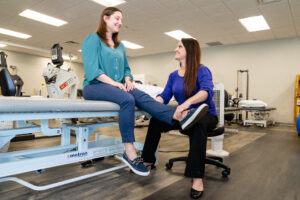National Women’s Health Week 2022

Back to physical health resource hub
National Women’s Health Week is the official start of Women’s Health Month. This week is dedicated to encouraging women to reflect on their health needs and actively take measures to improve their overall health.
As we progress through different stages of life, women experience various health-related changes. One example includes endocrine changes that result in reduced levels of several hormones, including estrogen. Decreased estrogen levels can impact cardiovascular function, contribute to heart disease, changes in bladder and sexual function.
Women also tend to experience a loss of connective tissue flexibility and bone mineral density, causing health-related changes, like arthritis and osteoporosis, respectively. Though many of these changes are not entirely avoidable, caring for your holistic wellness (mind, body, spirit) throughout your life’s journey can significantly improve your health outcomes.
Here are some ways you can improve your health and maintain a healthy lifestyle:
- Eat to live: Start with minor changes. Choose whole grains and lean meats, consume fruits and vegetables of various colors and skip processed sugar. Optimizing your diet is a great way to prevent chronic diseases across your lifespan.
- Manage your external stressors: Mental health is essential to your overall health and well-being. Meditate, pray or spend time in nature. Consider seeing a licensed mental health professional to manage stress, anxiety and depression symptoms.
- Move your body: Participate in 150 minutes of moderate-intensity aerobic exercise every week. Moderate-intensity aerobic activity should be challenging enough that you’re unable to sing the words to your favorite song, but you should still be able to talk.
- Schedule your annual physical examinations: Make sure you see your healthcare provider for preventive care, including PAP smears, mammograms, stress tests, cholesterol screenings, bone density scans, colonoscopies and other physical examinations. Early detection of changes in health markers is a great way to improve health outcomes.
- Talk to your doctor: If you notice changes in your cognitive, sexual, bladder, or other bodily functions, don’t be afraid to chat with your doctor. While some changes in function are common, they may not be normal. Management of many of these symptoms may include conservative treatments that significantly improve your quality of life and help you age well.
It’s never too late to make improvements to support healthy aging. Whether you’re 21 or 92, optimizing all dimensions of your wellness will improve your standard of living. If you or someone you know has joint pain, sexual or bladder dysfunction, osteoporosis/osteopenia, or other neuromusculoskeletal symptoms, contact your local Brooks Rehabilitation to schedule an evaluation to help you live your best life.
Read more about how we can celebrate our minds and bodies and aim to live a healthier and happier life.


